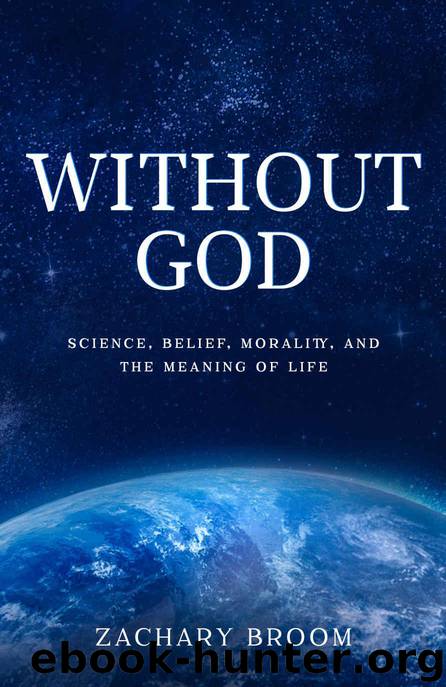Without God: Science, Belief, Morality, and the Meaning of Life by Broom Zachary

Author:Broom, Zachary [Broom, Zachary]
Language: eng
Format: azw3, epub
Published: 2019-08-21T16:00:00+00:00
CHAPTER NINE
A New Hope
“I hate mankind, for I think myself
one of the best of them, and I know how bad I am.”
― Samuel Johnson
“And he who was seated on the throne said,
“Behold, I am making all things new.”
― Revelation 21:5
The story of the Bible has been called the greatest story ever told, a great drama consisting of four acts: creation, fall, redemption, and restoration.1 The book of Genesis says that in the beginning, God created the heavens and the Earth: energy, time, and matter—and His creation was good, very good.2 From the very first words in the book of Genesis, humanity’s purpose is established by God. We were created for a reason, and this reason gives our lives purpose and meaning.
The Bible tells us that God created humanity for the purpose of living in a perfect, loving community with Himself and others. Unlike naturalism, which believes that love is the product of blind physical forces and biochemical reactions of the brain, and other religions that do not believe in a God of love, Christianity believes that love lies at the very center of the universe, as “God is love.”3 This teaching is demonstrated in the doctrine of the trinity, which holds that God has forever existed in a trinity of three persons: Father, Son, and Spirit. Though the doctrine of the trinity is profoundly mysterious to us, without it, God’s nature would be radically different. Unless God is a triune being, He can’t be a God of love. He could still be a God of wisdom, power, holiness, justice, goodness, and truth, but not love, since love only exists between persons. If God is unipersonal then love didn’t exist until He created other beings, which means that love is not an essential part of God’s nature. Only if God is triune by nature can love be a part of His essence.4
When God created humanity, He wasn’t creating us to fill a relational void, but instead to take part in what C. S. Lewis called, “the dance of God.” Lewis explained that the God of Christianity is “not a static thing―not even a person―but a dynamic, pulsating activity, a life, almost a kind of drama. Almost, if you will not think me irreverent, a kind of dance.”5 Lewis believed that each part of the trinity circles around the other, just like in a dance. The Father, Son, and Spirit love, adore, and glorify each other, as they have centered their happiness on the happiness of one another. This is the kind of loving relationship we were created to be a part of, the dance we were created for.
Because humanity was made for the purpose of living in relationship with God, there are at least three truths that naturally follow. The first is that our value lies not in what we can do, but in what we are. Unlike Humanism, Christianity holds that humanity is made in the very image of God (the Imago Dei), and so we have inherent value. J. L.
Download
Without God: Science, Belief, Morality, and the Meaning of Life by Broom Zachary.epub
This site does not store any files on its server. We only index and link to content provided by other sites. Please contact the content providers to delete copyright contents if any and email us, we'll remove relevant links or contents immediately.
| Adult Ministry | Children's Ministry |
| Counseling & Recovery | Discipleship |
| Evangelism | Missions & Missionary Work |
| Preaching | Sermons |
| Youth Ministry |
Victory over the Darkness by Neil T. Anderson(2868)
The Rape Of Nanking by Iris Chang(2823)
Chosen by God by R. C. Sproul(2164)
Habits of Grace by David Mathis(1983)
Crash the Chatterbox by Steven Furtick(1978)
Knowing God by J.I. Packer(1858)
How To Be Born Again by Billy Graham(1781)
A Prophet with Honor by William C. Martin(1725)
Gospel-Shaped Marriage by Chad van Dixhoorn(1719)
Peace with God by Billy Graham(1689)
Confronting Christianity by Rebecca McLaughlin(1593)
God's Smuggler by Brother Andrew(1548)
Angel Dreams by Virtue Doreen Virtue Melissa(1482)
Whisper by Mark Batterson(1456)
The School of Biblical Evangelism by Ray Comfort(1438)
Missionaries by Norman Lewis(1430)
The Truth War by John MacArthur(1426)
The Poems of Rowan Williams by Rowan Williams(1358)
Do Greater Things by Robby Dawkins(1328)
